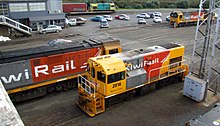New Zealand DH class locomotive
| New Zealand DH class (1978) | |||||||||||||||||||||||||||
|---|---|---|---|---|---|---|---|---|---|---|---|---|---|---|---|---|---|---|---|---|---|---|---|---|---|---|---|
 DH 2868 shunting two new DLs at Port of Auckland. | |||||||||||||||||||||||||||
| |||||||||||||||||||||||||||
| |||||||||||||||||||||||||||
| |||||||||||||||||||||||||||
| |||||||||||||||||||||||||||
The New Zealand DH class locomotive[nb 1] is a type of diesel-electric heavy transfer and shunting locomotive in New Zealand's national railway network. The class consists of six heavy shunt U10B type locomotives built by General Electric United States at their Erie, Pennsylvania plant[2] in 1978.[4][1] Five of the class are used in the Auckland area for heavy shunting duties, including services around Auckland and the Port of Auckland, while one is based at the Port of Tauranga in Mount Maunganui.[4]
Introduction
Originally an order for Philippine National Railways 2500 Class,[2] the six locomotives were purchased as by coincidence NZR needed a heavy shunter for Auckland container port transfer work. At the time two DSC class shunters were linked in tandem to perform this task. The DH class are a light locomotive that is geared to run at 100 km/h (62 mph).
They saw occasional service on the then under-used Auckland suburban passenger network where they performed well, but NZR focused them on their intended purpose, heavy shunting. In the late 1980s, NZR provided a DH locomotive to the Tasman Pulp and Paper mill in Kawerau to trial for sale as a heavy shunter in the mill's rail yards.[4] The mill turned down the offer, instead, they purchased a DA class locomotive to perform shunting duties. In July 1979 DH905 was trialled at the Te Rapa marshalling yards in Hamilton, but the trial was unsuccessful and the locomotive returned to Auckland later that year.[2] All DH locomotives were allocated to Westfield (Auckland) in 1990.[5]
Classification
The class should not be confused with the English Electric DH class of 1956; as all of the old DHs had been reclassified as DG in 1968, the classification was re-used.
Upgrades

The locomotives were upgraded in the late 1990s with shunters refuges at the front and back of the locomotives, in line with other New Zealand shunting locomotives at the time.[1] In the 2010s the class were upgraded again for multiple unit (MU) operation.[6]
Other users

The Hedjaz Jordan Railway has three GE U10B locomotives of 1,050 mm (3 ft 5+11⁄32 in) gauge. These are of A1A-A1A wheel arrangement. Another user is the Belgrano Sur Line (Buenos Aires), Argentina. The Bogotá Savannah Railway has two GE U10B locomotives
References
Footnotes
- ^ Following the introduction of TMS in 1979, the class classification was capitalised, whereas previously the second letter was a smaller capital letter, that is DH
Citations
- ^ a b c d "New Zealand Railways Rolling Stock Lists - DH GE U10B class of 1978". Archived from the original on 24 February 2019. Retrieved 24 February 2019.
- ^ a b c d McClare 1980, p. 34.
- ^ Parsons 2002, p. 60.
- ^ a b c Parsons 2002, p. 14.
- ^ "NZR's locomotive fleet - where to from here?". Rails: 257. July 1990. ISSN 0110-6155.
- ^ KiwiRail 2011, p. 14.
Bibliography
- McGavin, T A (1983). NZR Locomotives and Railcars 1983. Wellington, New Zealand: New Zealand Railway and Locomotive Society.
- McClare, E J (1980). New Zealand Railway Diesels. Wellington, New Zealand: Southern Press. ISBN 9780907769286.
- Parsons, David (2002). New Zealand Railway Motive Power 2002. New Zealand Railway and Locomotive Society. p. 64. ISBN 978-0-908573-78-3. Archived from the original on 7 March 2007. Retrieved 24 February 2019.
- KiwiRail Locomotive and Rolling Stock Register - 2011. Mosgiel, New Zealand: Triple M Productions. 2011. ISBN 978-0-9582072-2-5.
